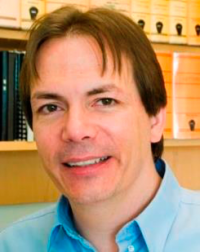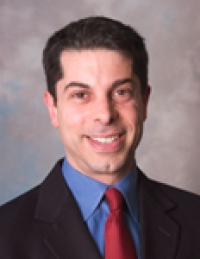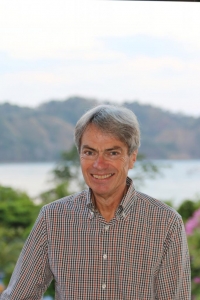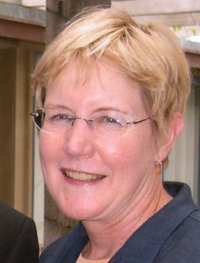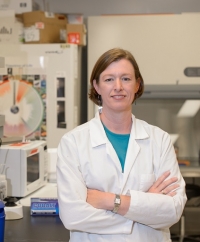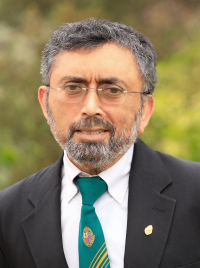The Evolution of Human Biodiversity
Biographical Sketches: Co-Chairs
University of Washington School of Medicine
Evan Eichler, PhD, is a Professor and Howard Hughes Medical Institute Investigator in the Department of Genome Sciences, University of Washington School of Medicine, and serves on the CARTA External Advisory Board. He graduated with a B.Sc. Honours degree in Biology from the University of Saskatchewan, Canada, in 1990. He received his PhD in 1995 from the Department of Molecular and Human Genetics at Baylor College of Medicine, Houston, Texas. After a Hollaender postdoctoral fellowship at Lawrence Livermore National Laboratory, he joined the faculty of Case Western Reserve University in 1997 and later the University of Washington in 2004. He was a March of Dimes Basil O’Connor Scholar (1998–2001), appointed as an HHMI Investigator (2005), awarded an AAAS Fellowship (2006) and the American Society of Human Genetics Curt Stern Award (2008), and elected to the National Academy of Sciences (2012) and the National Academy of Medicine (2017). He is an editor of Genome Research and has served on various scientific advisory boards for both the NIH and NSF. His research group provided the first genome-wide view of segmental duplications within human and other primate genomes and he is a leader in an effort to identify and sequence normal and disease-causing structural variation in the human genome. The long-term goal of his research is to understand the evolution and mechanisms of recent gene duplication and its relationship to copy number variation and human disease with a specific emphasis on the genetic architecture of autism and neurodevelopmental delay.
UC San Diego
Pascal Gagneux is CARTA's Executive Co-Director, a Professor of Pathology and Anthropology, and the Department Chair of Anthropology at UC San Diego. He is interested in the evolutionary mechanisms responsible for generating and maintaining primate molecular diversity. The Gagneux laboratory studies cell-surface molecules in closely related primates species. His focus is on glycans, the oligosaccharides attached to glycolipids and glycoproteins of the surfaces of every cell and also secreted into the extra-cellular matrix. Gagneux's laboratory is exploring the roles of molecular diversity in protecting populations from pathogens as well as potential consequences for reproductive compatibility. Dr. Gagneux’s interest is in how glycan evolution is shaped by constraints from endogenous biochemistry and exogenous, pathogen-mediated natural selection, but could also have consequences for sexual selection. Dr. Gagneux has studied the behavioral ecology of wild chimpanzees in the Taï Forest, Ivory Coast, population genetics of West African chimpanzees, and differences in sialic acid biology between humans and great apes with special consideration of their differing pathogen regimes. In 2011, while Associate Director of CARTA, Dr. Gagneux helped to establish a graduate specialization in Anthropogeny at UC San Diego. This wholly unique graduate specialization is offered through eight participating graduate programs in the social and natural sciences at UC San Diego.
Biographical Sketches: Speakers
University of Washington School of Medicine
Michael J. Bamshad, MD, is professor in the Department of Pediatrics and adjunct professor of genome sciences at the University of Washington. His laboratory addresses the origins and affinities of humans, develops novel strategies to find disease susceptibility variants and characterizes genetic variants influencing risk for an assortment of health-related conditions.
Bamshad is particularly interested in identifying genetic variants that cause birth defects that alter risk for chronic diseases of childhood, infections and preterm birth, and that influence chemosensory perception such as taste. His laboratory has identified genetic variants that underlie several disorders manifested by either limb defects or heart defects. Bamshad’s lab has recently discovered that mutations in several genes (e.g., TNNI2, TNNT3, TPM2, MYH3) that encode proteins of the contractile apparatus of fast-twitch myofibers cause several syndromes characterized by contractures of the feet such as clubfoot. Researchers in his lab are now trying both to understand the mechanism by which these mutations disrupt muscle function and also to determine whether these genes influence susceptibility to idiopathic clubfoot.
Stanford University
Carlos Bustamante is Professor of Genetics in the Department of Genetics at Stanford University School of Medicine. He earned his Ph. D. in biology, along with an MA in statistics, at Harvard University in 2001. After his postdoctoral training in mathematical genetics at the University of Oxford, he joined the faculty at Cornell University in 2002. He moved his laboratory to Stanford in January, 2010. He is a population geneticist whose research focuses on analyzing genome wide patterns of variation within and between species to address fundamental questions in biology, anthropology, and medicine. His group works on a variety of organisms and model systems ranging from humans and other primates to domesticated plant and animals. Much of his research is at the interface of computational biology, mathematical genetics, and evolutionary genomics and is funded, in part, by the National Institutes of Health and the National Science Foundation. Examples of his research accomplishments contributions include: developing “selection maps” of the human genome which pinpoint rapidly evolving genes as well as genomic regions subject to strong selective constraint; developing a high-density map of genetic variation in the dog genome and using it to identify genomic regions underlying morphological differences among domestic dog breeds; and investigating the role copy number variation in a family of immunity genes plays in simian AIDS progression for macaque models H.I.V/AIDS. His most current research focuses on human population genomics and global health including developing statistical, computational, and genomic resources for enabling trans- and multi-ethnic genome-wide association and medical sequencing studies of common human diseases.
The University of Washington
George Ojemann is a professor of neurosurgery at the University of Washington. Dr. Ojemann uses neurosurgical approaches to investigate the basic neurobiology of human cognition, especially language, memory and learning. These investigations have included studies of the localization of sites in human cortex where function is apparently essential for language and recent memory (using the electrical stimulation mapping technique), localization of sites where neurons are active with those functions (using optical imaging of the "intrinsic" signal from human cortical surface) and correlates of language, recent memory and learning in recordings of neuronal activity in human cortex.
Stanford University
Peter Parham is Professor in the Departments of Structural Biology and Microbiology & Immunology at the Stanford University School of Medicine. As an undergraduate Dr Parham studied Natural Sciences at Cambridge University, subsequently obtaining his PhD in Biochemistry and Molecular Biology at Harvard University with Professor Jack Strominger. Elected a Junior Fellow of the Society of Fellows at Harvard, he spent a year working with Walter Bodmer in the Department of Genetics at Oxford University, before returning to Harvard to start his independent research program. Dr Parham joined the Stanford faculty in 1980. Throughout his career Dr Parham’s research has focused on proteins of the human immune system that vary greatly between individuals and populations. These differences, the consequence of natural selection, not only modulate the immune response to infection and cancer, but also influence the success of reproduction and therapeutic transplantion of cells, tissues and organs. Dr Parham has received scientific awards from the Leukemia Society of America, the American Society of Histocompatibility and Immunogenetics, the European Federation of Immunogenetics and the British Society of Immunology; in 2008 he was elected fellow of the Royal Society. Dr Parham has served on the Editorial Board of several major immunology Journals and as Editor-in Chief for Immunological Reviews. He is also the author of an introductory text-book ‘The Immune System’ that is used worldwide in immunology courses for undergraduate and professional students.
UC San Diego
Margaret Schoeninger is Distinguished Professor Emerita of Anthropology at UC San Diego, a Research Archaeologist in the Glenn Black Laboratory of Archaeology at Indiana University, and Emerita Co-Director of CARTA. She has done fieldwork in North America, Mexico, Pakistan, India, Kenya, and Tanzania as well as laboratory research on carbon, nitrogen, and oxygen stable isotope ratio analysis in biological tissues and food component analysis of traditional foods. Her major interest is in the evolution of human diet particularly as it informs our understanding of the appearance and evolution of the human lineage.
Arizona State University
Anne Stone is a Regents' Professor in the School of Human Evolution and Social Change at the Arizona State University and serves on the CARTA External Advisory Board. Her specialization and main area of interest is anthropological genetics. Currently, her research focuses on population history and understanding how humans and the great apes have adapted to their environments, including their disease and dietary environments. This has three main strands: (a) Native American population history, (b) the evolutionary history of the Great Apes, and (c) understanding the co-evolutionary history of mycobacteria (specifically Mycobacterium tuberculosis and M. leprae, the causative agents of tuberculosis and leprosy, respectively) with human and non-human primates. Dr. Stone received undergraduate degrees in archaeology and biology from the University of Virginia. She has a Ph.D. in anthropology from the Pennsylvania State University. During her graduate study, she received a Fulbright scholarship to study at the Ludwig Maximillian University in Munich, Germany with Dr. Svante Pääbo. After completing her Ph.D., she received a National Institutes of Health NRSA postdoctoral fellowship to work with Dr. Michael Hammer at the University of Arizona. Before joining the faculty at ASU in 2003, Professor Stone taught at the University of New Mexico. In 2011, she was elected a fellow of the American Association for the Advancement of Science, and in 2016, she was elected to the National Academy of Sciences. Stone has served on the editorial boards of the American Journal of Physical Anthropology and the Journal of Human Evolution, and currently serves as a senior editor of Molecular Biology and Evolution.
University of Pennsylvania, Perelman School of Medicine
Sarah Tishkoff is the David and Lyn Silfen University Professor in Genetics and Biology at the University of Pennsylvania, holding appointments in the School of Medicine and the School of Arts and Sciences. She is also the Director of the Penn Center for Global Genomics & Health Equity in the Department of Genetics and serves on the CARTA External Advisory Board.
Dr Tishkoff studies genomic and phenotypic variation in ethnically diverse Africans. Her research combines field work, laboratory research, and computational methods to examine African population history, the genetic basis of anthropometric, cardiovascular, and immune-related traits, and how humans have adapted to diverse environments and diets.
Dr Tishkoff is a member of the National Academy of Sciences, the American Academy of Arts and Sciences, and the National Academy of Medicine. She is a recipient of an NIH Pioneer Award, a David and Lucile Packard Career Award, a Burroughs/Wellcome Fund Career Award, the ASHG Curt Stern Award, and a Penn Integrates Knowledge (PIK) endowed chair. She is on the NAS Board of Global Health and the Scientific Advisory Board for the Packard Fellowships in Science and Engineering, and is on the editorial boards at Cell, PLOS Genetics, and G3 (Genes, Genomes, and Genetics).
Her research is supported by grants from the National Institutes of Health, the Chan Zuckerberg Institute, the American Diabetes Association, and the Pennsylvania Department of Health.
UC San Diego School of Medicine
Ajit Varki is a Distinguished Professor of Medicine and Cellular & Molecular Medicine, Emeritus Co-Director of CARTA, Emeritus Co-Director of the Glycobiology Research and Training Center at UC San Diego, and Adjunct Professor at the Salk Institute. He received basic training in physiology, medicine, biology, and biochemistry at the Christian Medical College (CMC), Vellore, The University of Nebraska, and Washington University in St. Louis. He also has formal training and board certification in internal medicine, hematology, and oncology. Varki is the executive editor of Essentials of Glycobiology (Cold Spring Harbor Press, 4th Edition, 2022) and is recipient of a MERIT award from the NIH, and an American Cancer Society Faculty Research Award. Honorific elections include the American Academy of Arts and Sciences, the National Academy of Medicine, the American Society for Clinical Investigation, and the Association of American Physicians. He is also recipient of the three highest honors in his field, the Karl Meyer Award of the Society for Glycobiology, the International Glycoconjugate Organization Award and the Rosalind Kornfeld Award for Lifetime Achievement in Glycobiology. He is recognized for creating the first major open access research journal (J. Clin. Invest., 1996) as well as the first major open access textbook (Essentials of Glycobiology, 2009). He was honored with the Old Cottonian of Eminence Award at the 150th Anniversary of Bishop Cotton Boys School, Bangalore, India, (2015) as well as a Distinguished Faculty Medal and Oration at his medical school alma mater, CMC, Vellore. Significant past appointments include: Co-Head, UC San Diego Division of Hematology-Oncology; President of the Society for Glycobiology; Editor-in-Chief of the Journal of Clinical Investigation; Interim Director of the UC San Diego Cancer Center, President of the American Society for Clinical Investigation, and UC San Diego Associate Dean for Physician-Scientist Training. Varki's research interests are focused on a family of cell surface sugars called sialic acids, and their roles in biology, evolution and disease. Currently, active projects are relevant to the roles of sialic acids in microbial infectivity, the regulation of the immune response, the progression and spread of tumors, aging, and unique aspects of human evolution. His group is particularly intrigued to find multiple interrelated differences in sialic acid biology between humans and our closest evolutionary cousins, the "great apes." These differences are a signature of the events that occurred during the last few million years of human evolution, and appear to be relevant to understanding several aspects of the current human condition, both in health and disease. Varki’s book, Denial (Twelve, Hachette Books, 2013), explores a novel "Mind Over Reality Transition” (MORT) theory that denying reality and personal mortality was a key step in allowing the emergence of a full theory of mind, and in the origin of our species.
